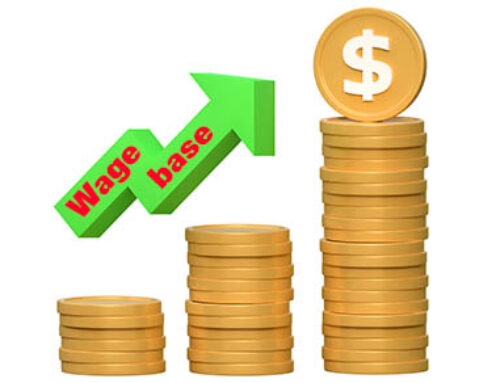
The Social Security Administration recently announced that the wage base for computing Social Security tax will increase to $160,200 for 2023 (up from $147,000 for 2022). Wages and self-employment income above this threshold aren’t subject to Social Security tax.
Basics about Social Security
The Federal Insurance Contributions Act (FICA) imposes two taxes on employers, employees and self-employed workers. One is for the Old Age, Survivors and Disability Insurance program, which is commonly known as Social Security. The other is for the Hospital Insurance program, which is commonly known as Medicare.
There’s a maximum amount of compensation subject to the Social Security tax, but no maximum for Medicare tax. For 2023, the FICA tax rate for employers is 7.65% — 6.2% for Social Security and 1.45% for Medicare (the same as in 2022).
2023 updates
For 2023, an employee will pay:
- 6.2% Social Security tax on the first $160,200 of wages (6.2% of $160,200 makes the maximum tax $9,932.40), plus
- 1.45% Medicare tax on the first $200,000 of wages ($250,000 for joint returns; $125,000 for married taxpayers filing a separate return), plus
- 2.35% Medicare tax (regular 1.45% Medicare tax plus 0.9% additional Medicare tax) on all wages in excess of $200,000 ($250,000 for joint returns; $125,000 for married taxpayers filing a separate return).
For 2023, the self-employment tax imposed on self-employed people is:
- 12.4% Social Security tax on the first $160,200 of self-employment income, for a maximum tax of $19,864.80 (12.4% of $160,200), plus
- 2.9% Medicare tax on the first $200,000 of self-employment income ($250,000 of combined self-employment income on a joint return, $125,000 on a return of a married individual filing separately), plus
- 3.8% (2.9% regular Medicare tax plus 0.9% additional Medicare tax) on all self-employment income in excess of $200,000 ($250,000 of combined self-employment income on a joint return, $125,000 for married taxpayers filing a separate return).
Employees with more than one employer
What happens if one of your employees works for your business and has a second job? That employee would have taxes withheld from two different employers. Can the employee ask you to stop withholding Social Security tax once he or she reaches the wage base threshold? Unfortunately, no. Each employer must withhold Social Security taxes from the individual’s wages, even if the combined withholding exceeds the maximum amount that can be imposed for the year. Fortunately, the employee will get a credit on his or her tax return for any excess withheld.
Looking forward
Contact us if you have questions about 2023 payroll tax filing or payments. We can help ensure you stay in compliance.
© 2022
The Social Security Administration recently announced that the wage base for computing Social Security tax will increase to $160,200 for 2023 (up from $147,000 for 2022). Wages and self-employment income above this threshold aren’t subject to Social Security tax.
Basics about Social Security
The Federal Insurance Contributions Act (FICA) imposes two taxes on employers, employees and self-employed workers. One is for the Old Age, Survivors and Disability Insurance program, which is commonly known as Social Security. The other is for the Hospital Insurance program, which is commonly known as Medicare.
There’s a maximum amount of compensation subject to the Social Security tax, but no maximum for Medicare tax. For 2023, the FICA tax rate for employers is 7.65% — 6.2% for Social Security and 1.45% for Medicare (the same as in 2022).
2023 updates
For 2023, an employee will pay:
- 6.2% Social Security tax on the first $160,200 of wages (6.2% of $160,200 makes the maximum tax $9,932.40), plus
- 1.45% Medicare tax on the first $200,000 of wages ($250,000 for joint returns; $125,000 for married taxpayers filing a separate return), plus
- 2.35% Medicare tax (regular 1.45% Medicare tax plus 0.9% additional Medicare tax) on all wages in excess of $200,000 ($250,000 for joint returns; $125,000 for married taxpayers filing a separate return).
For 2023, the self-employment tax imposed on self-employed people is:
- 12.4% Social Security tax on the first $160,200 of self-employment income, for a maximum tax of $19,864.80 (12.4% of $160,200), plus
- 2.9% Medicare tax on the first $200,000 of self-employment income ($250,000 of combined self-employment income on a joint return, $125,000 on a return of a married individual filing separately), plus
- 3.8% (2.9% regular Medicare tax plus 0.9% additional Medicare tax) on all self-employment income in excess of $200,000 ($250,000 of combined self-employment income on a joint return, $125,000 for married taxpayers filing a separate return).
Employees with more than one employer
What happens if one of your employees works for your business and has a second job? That employee would have taxes withheld from two different employers. Can the employee ask you to stop withholding Social Security tax once he or she reaches the wage base threshold? Unfortunately, no. Each employer must withhold Social Security taxes from the individual’s wages, even if the combined withholding exceeds the maximum amount that can be imposed for the year. Fortunately, the employee will get a credit on his or her tax return for any excess withheld.
Looking forward
Contact us if you have questions about 2023 payroll tax filing or payments. We can help ensure you stay in compliance.
© 2022



